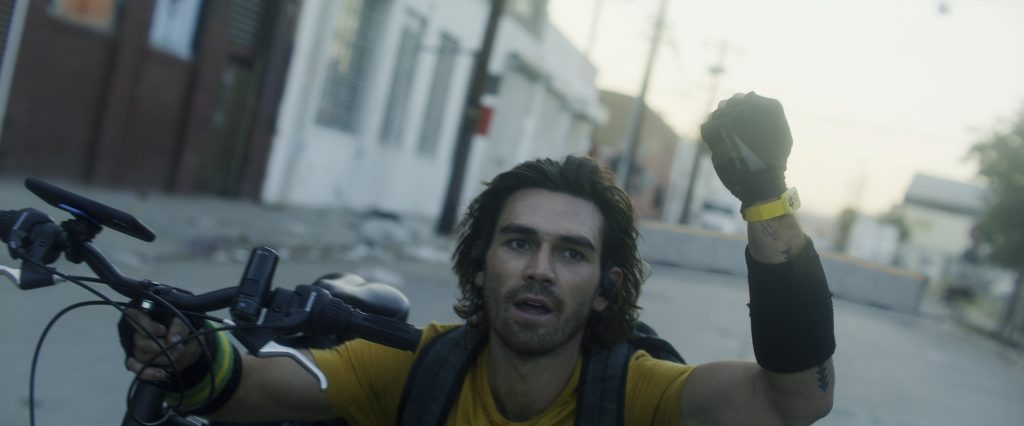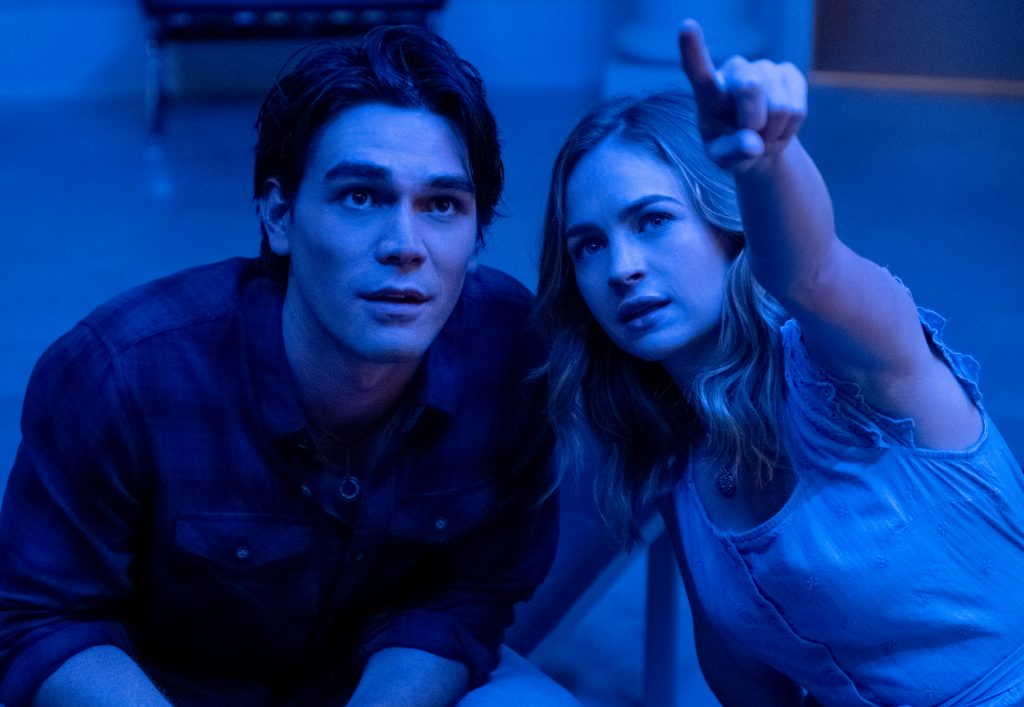December 16, 2020
by Carla Hay

Directed by Adam Mason
Some language in Spanish with subtitles
Culture Representation: Taking place in Los Angeles during a coronavirus pandemic in the year 2024, the sci-fi thriller “Songbird” features a predominantly white cast of characters (with a few Latinos and African Americans) representing the working-class, middle-class and wealthy.
Culture Clash: During the pandemic, a minority of people have immunity to the disease but are also supercarriers of the virus, and this dichotomy affects relationships and has caused a black market to sell illegal immunity passes.
Culture Audience: “Songbird” will appeal primarily to people who like watching tacky disaster movies with ridiculous plot developments.

In the horrifically tasteless disaster film “Songbird,” which takes place during a coronavirus pandemic that has killed millions of people and devastated the entire world, unscrupulous and greedy people have exploited the situation so that they can benefit financially. Ironically, it’s the same mindset that is obviously why this moronic film was rushed into production during the real-life COVID-19 pandemic—to cash in on people’s fears about the pandemic and use the movie’s pandemic storyline as a gimmick to sell it during a real-life pandemic. The results are a useless movie where every single second looks like it was based on an early, substandard screenplay draft, with none of the filmmakers caring about taking the time to improve the film’s quality.
“Songbird” (directed by Adam Mason, who co-wrote the movie’s screenplay with Simon Boyes) takes place in Los Angeles in the year 2024. The worldwide mortality rate has risen to 56% and 8.4 million people have died because of COVID-23, which is supposed to be a deadlier strain than COVID-19. And there’s no vaccine. The desolate and devastated landscape of Los Angeles looks like a city in the aftermath of a tornado, and there’s a general atmosphere that a corrupt, totalitarian government is in charge. Because of this high mortality rate, Los Angeles has been on lockdown, with people ordered to stay at home, except for essential workers.
One of those essential workers is a bike courier in his mid-20s named Nicholas “Nico” Price (played by KJ Apa), who works for an online retailer called Lester’s Gets, which sells a variety of items that people can use in their homes. It’s not a giant company, because Nico’s boss Lester (played by Craig Robinson) is the only person shown in the dark video control room that monitors the movements of the company’s couriers, via GPS. In other words, the film’s budget was so low that the filmmakers didn’t bother to cast anyone else to work in this monitor room.
Lester communicates frequently with Nico and has to watch Nico like a hawk, because Nico often takes detours, goofs off, and is late with deliveries. For example, in one of the movie’s scenes, Nico randomly shoots hoops at a basketball court while in the middle of a delivery. Lester lectures Nico about Nico’s constant tardiness, but Nico acts like someone who knows he probably won’t be fired.
And why hasn’t Nico been fired because of his tardiness? Because he’s one of the small minority of people on Earth who are immune to COVID-23, and therefore he can freely go outside without needing any face coverings. However, these Immunies, as they’re nicknamed in this movie, are also supercarriers of COVID-23. And so, they’re both envied and shunned by the general population.
Immunies are identified by immunity passes (which look like yellow wristbands) that can be scanned to reveal their personal information. These immunity passes are highly coveted by people who want to be able to go outside whenever they want without fear of being fined or arrested. People are required to take frequent COVID-23 tests at home, which are done on government-issued hand-held monitors that can diagnosis people just by scanning their faces.
People who are found to be infected with COVID-23 are forced to go to the Q-Zone, which is not a health recovery center but it’s described in the story as a death detention center. These detentions are handled by the sanitation department, which is headed by Emmett D. Harland (played by Peter Stromare), who’s an Immunie. Emmett is such an over-the-top, creepy villain that you just know he’s involved in more misdeeds than just being rough and unmerciful with the people he detains.
Because of these drastic changes in society, Los Angeles (and presumably, most of the rest of the modern world) has become a place where people have become paranoid about going outside, for fear of being sent to the Q-Zone. Masked military soldiers patrol the streets and are ready to send people to the Q-Zone if they don’t have immunity passes. Some of these patrollers are quick to draw their guns if they see anyone on the street without a mask. It’s what happens to Nico when he tries his make his way to a home for a delivery, and he’s blocked by overzealous soldiers until Nico shows them his immunity pass.
The high demand for immunity passes has caused these passes to be sold on the black market at prices that can only be afforded by wealthy people or people who can come up with the cash any way that they can. Two of the people who are considered among the top-tier sellers of illegal immunity passes are unhappily married couple William Griffin (played by Bradley Whitford) and Piper Griffin (played by Demi Moore), who are already living an upscale life but apparently are greedy and want more money. William’s day job is as a high-ranking executive in the music industry, even though the movie never shows him doing any work except his illegal side hustle of selling immunity passes.
And because “Songbird” is a movie like the 2005 drama “Crash,” which eventually shows how everyone in the story is connected to each other in some way, the Griffins’ home is one of the places where Nico makes a delivery. People are not allowed to open their doors to delivery people. Instead, deliveries are dropped into a capsule outside a home, and the item in the capsule is then disinfected through ultra-violet rays.
Nico has been to the Griffin home enough times that the house residents recognize him when he arrives. William and Piper have a daughter named Emma (played by Lia McHugh), who’s about 11 or 12 years old and who has respiratory problems, because she always has to wear an oxygen tube. The implication is that she’s especially vulnerable to getting COVID-23.
Emma is really just a “token” underdeveloped character that doesn’t serve any purpose in the movie except to try to make William and Piper look more sympathetic. It’s a futile effort, because these two spouses, who have simmering hatred for each other, are ruthless and sleazy, although one of them turns out to be a lot worse than the other. An innocent and sweet kid like Emma doesn’t deserve the parents she has.
Meanwhile, although Nico might seem to have a cavalier and cocky exterior when he’s on the job, the movie slowly shows that he’s actually in a lot of emotional turmoil. His entire family is dead, presumably because of COVID-23. And before the pandemic, he was a paralegal with plans to become a lawyer, but he had to abandon those dreams. There’s a scene where Nico goes back to the now-deserted law office where he used to work and bitterly goes through some of the remnants of his past.
But more heartbreaking for Nico than the loss of his career dreams is the fact that he’s fallen in love with a woman who’s around his age, but they haven’t been able to be in the same room together because of the pandemic. Her name is Sara Garcia (played by Sofia Carson), who lives in an apartment with her beloved grandmother Lita (played Elpidia Carrillo), whom Sara calls Grammy. Sara’s parents are also dead because of COVID-23.
Nico and Sara met when he made a delivery to her apartment. They had an instant connection and fell in love through constant contact over the phone. Nico also visits Sara by going to her apartment, but not going inside and instead talking to her outside the apartment door. It’s explained that the apartment building is under heavy government surveillance, because it’s a “hot spot” for COVID-23 infections. Therefore, Nico and Sara know they could be arrested if he’s allowed inside her apartment, and Sara and Lita could be sent to the dreaded Q-Zone.
Sara sees firsthand (through her front-door keyhole) how brutal one of these arrests can be, when one of her female neighbors is dragged from her apartment, yelling and pleading for mercy, because the neighbor tested positive for COVID-23. Before the hazmat-suit-wearing sanitation workers arrive to take her to the Q-Zone, the neighbor begs Sara to let her inside Sara’s apartment to hide, but Sara refuses to hide the neighbor, on Nico’s advice. Emmett is supervising this particular detainment with sadistic glee. And he vows that he will be back to this apartment building to get more people because he’s convinced that the entire building is infected.
There are several scenes in “Songbird” where Nico talks to Sara through her apartment door, like he’s her pandemic Romeo to her quarantined Juliet. It’s supposed to be romantic, but Nico and Sara just utter cheesy soap-opera-type dialogue to each other that will make viewers roll their eyes or laugh at the corniness of it all. And when Lita starts having a persistent cough, you know exactly where this movie is going to go in the “race against time” part of the film that’s supposed to make this movie a suspenseful thriller.
Meanwhile, one of Lester’s employees who works from home is a lonely paraplegic named Dozer (played by Paul Walter Hauser), a military veteran in his mid-30s who lost the use of his legs during the war in Afghanistan. Dozer, who’s been a self-described shut-in for the past six years, uses a drone to keep track of Lester’s courier employees. Dozer has a strong sense of right and wrong and likes feeling as if he’s a “rescuer,” which all affect his actions later in the story.
Dozer has been a subscriber to a pretty YouTuber named May (played by Alexandra Daddario), who is a self-described struggling singer/songwriter. She has a YouTube channel called May Sings the Blues, where she sings cover songs and her own original music during livestreams and in prerecorded videos. People who watch her YouTube channel have the option to donate money to her, because she often tells her viewers that the pandemic has made it impossible for her to make money by performing in person.
Dozer has been one of her biggest donors, so May decides to connect with him online and reaches out to him to personally thank him. They begin chatting and soon get very candid with each other about the problems in their lives. Dozer tells May about being a shut-in: “I was in lockdown before it was fashionable.”
May tells Dozer that she moved to Los Angeles because a guy in the music industry promised to make her a big star. She and the guy ended up having an affair, which she now regrets, but the guy still wants to keep seeing her. And then the pandemic happened, and she’s been stuck in an uncomfortable limbo where she still needs the guy to help her with her career, but she wants to break off their affair.
Because of the strict lockdown, it’s illegal for people to have in-person social visits with other people who don’t live in the same household, but May’s lover insists on visiting her for their sexual encounters. May confides in Dozer that she’s afraid of getting infected and/or arrested because of this guy. Dozer offers to help her any way that he can. May’s “mystery lover” is eventually revealed, and it will be shocking to no one who’s seen enough of these types of formulaic, unimaginative movies.
Except for the COVID-23 pandemic aspect of the movie, there’s absolutely nothing unique about “Songbird,” which is a lot like many other badly made post-apocalyptic movies that have a weak, nonsensical plot and dumb action scenes. There’s a chase scene where Nico gets trapped in a building with Emmett and some of Emmett’s armed goons. And out of nowhere, Nico gets help from a gun-toting vigilante named Boomer (played by Paul Sloan), who randomly shows up in the scene and then is never seen in the movie again.
Viewers will also have sit through lots of inane dialogue, such as during another scene when Emmett has cornered some people he wants to capture. He taunts them by saying, “Roses are red. Violets are blue. You think you can hide? I’ll find you!”
One of the producers of “Songbird” is Michael Bay, who’s best known as the chief filmmaker for the “Transformers” movie franchise and the first two “Bad Boys” movies. Even though those movies had mediocre-to-bad screenplays, at least those films had high-octane action to keep people interested and wanting more. “Songbird” doesn’t even have memorable action scenes, unless you think it’s an improvement that at one point in the story, Nico ditches his bicycle and replaces it with a stolen motorcycle.
It all leads up to an ending that’s so terrible that it will make people either laugh or get angry, depending on how much it might bother people that their time was wasted by watching this garbage. And why is this movie called “Songbird,” when the only singer in the movie is a supporting character, not a leading character? Just like this entire ludicrous movie, it doesn’t make sense and it’s too lazy to try to give any logical explanations.
STX released “Songbird” on VOD on December 11, 2020.


